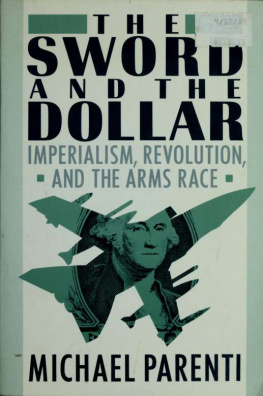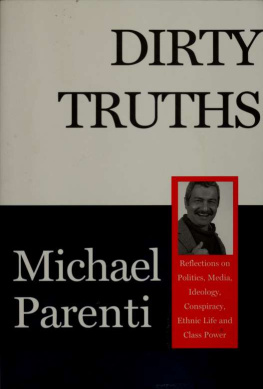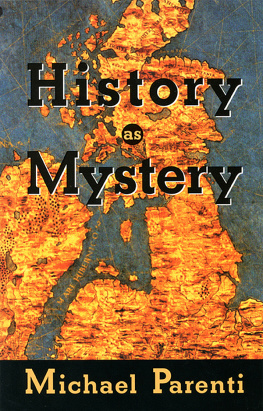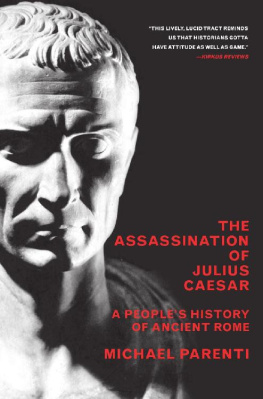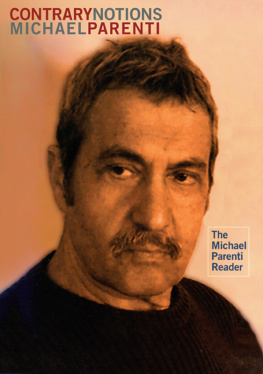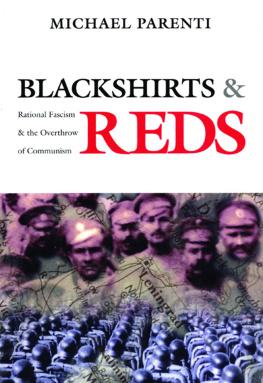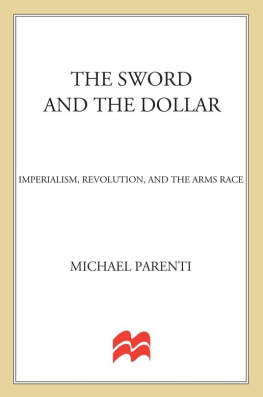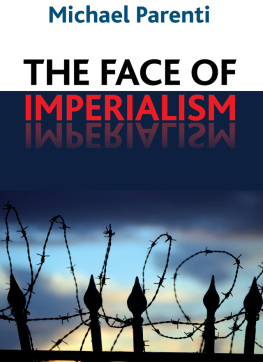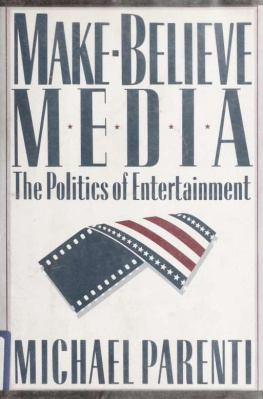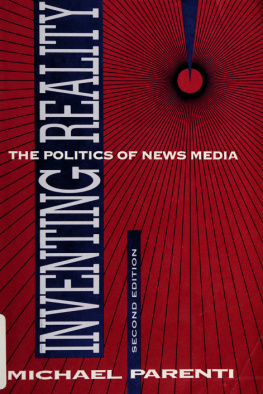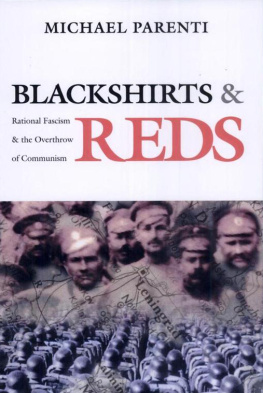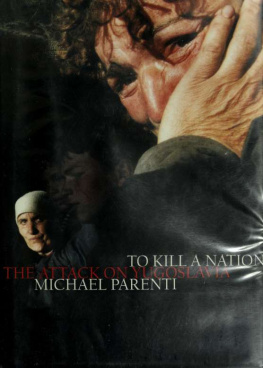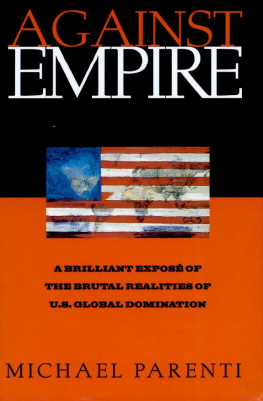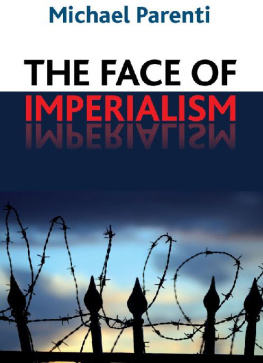Michael Parenti - The Sword and the Dollar: Imperialism, Revolution, and the Arms Race
Here you can read online Michael Parenti - The Sword and the Dollar: Imperialism, Revolution, and the Arms Race full text of the book (entire story) in english for free. Download pdf and epub, get meaning, cover and reviews about this ebook. year: 1988, publisher: St. Martin’s Press
Romance novel
Science fiction
Adventure
Detective
Science
History
Home and family
Prose
Art
Politics
Computer
Non-fiction
Religion
Business
Children
Humor
Choose a favorite category and find really read worthwhile books. Enjoy immersion in the world of imagination, feel the emotions of the characters or learn something new for yourself, make an fascinating discovery.
- Book:The Sword and the Dollar: Imperialism, Revolution, and the Arms Race
- Author:
- Publisher:St. Martin’s Press
(first published October 15th 1988) - Genre:
- Year:1988
- Rating:4 / 5
- Favourites:Add to favourites
- Your mark:
- 80
- 1
- 2
- 3
- 4
- 5
The Sword and the Dollar: Imperialism, Revolution, and the Arms Race: summary, description and annotation
We offer to read an annotation, description, summary or preface (depends on what the author of the book "The Sword and the Dollar: Imperialism, Revolution, and the Arms Race" wrote himself). If you haven't found the necessary information about the book — write in the comments, we will try to find it.
The Sword and the Dollar: Imperialism, Revolution, and the Arms Race — read online for free the complete book (whole text) full work
Below is the text of the book, divided by pages. System saving the place of the last page read, allows you to conveniently read the book "The Sword and the Dollar: Imperialism, Revolution, and the Arms Race" online for free, without having to search again every time where you left off. Put a bookmark, and you can go to the page where you finished reading at any time.
Font size:
Interval:
Bookmark:

This book made available by the Internet Archive.



To Si Gerson, Sophie Gersort, and Sender Garlin, longtime warriors in the struggle against imperialism

I would like to thank Kathleen Lipscomb, Lisa Moore, and Cathy Newton for the assistance they rendered in the preparation of this book. Once again Marvin Gettleman and Victor Wallis came through with materials and suggestions that were most useful. A special expression of gratitude is owed to Kathleen McGuire and Colleen McGuire, who provided selfless succor in the early stages of writing and valuable criticisms of the manuscript. In addition, the staff at St. Martin's Press has my thanks, specifically Larry Swanson, Elizabeth Caldwell, and Laura Ann Starrett.
An abundance of helpful suggestions were provided by James F. Petras of State University of New York, Binghamton; Donald R. Culverson of Macalester College; and Ronald T. Fox of California State University, Sacramento.
Why does the United States support right-wing autocracies around the world? Why is it antagonistic toward revolutionary movements and most socialist countries? Why does the United States intervene in other countries with military aid, embargoes, surrogate counterrevolutionary forces, and the US military? Why does the United States have military bases all around the world? Why does it spend hundreds of billions yearly on military appropriations? Why do Washington and Moscow have nuclear arsenals that can blow up the world many times over? In this book, I propose to answer these and other such questions and show that they are very much related to each other.
The debate over US foreign policy, as conducted in the political mainstream by liberals and conservatives, is a narrow one that evades the great realities of political economy. Conservatives argue that our policy has been "no-win" and fainthearted, that we too often play the "helpless giant" pushed around by third-rate powers, that we fail to stand up sufficiently to the "Soviet challenge" and have fallen dangerously behind the USSR in military capability, and that the Communist tide will soon be lapping at our bordersas Ronald Reagan put itunless we squelch revolutionary movements in this hemisphere and elsewhere.
According to conservatives the world is inhabited by terrorist hit squads, evil empires, Communist aggressors, and other such mortal threats. Like the bloodthirsty savages of some Hollywood western or jungle epic, or the alien creatures of a science fiction film, these "enemies" are motivated not by any concern for their own welfare, but by a mindless impulse to destroy or subjugate us. So we must draw the Free World wagon train in a circle, a defensive perimeter that includes almost all of Europe, Asia, Africa, Latin America, and North America. Should we falter in our resolve, slip in military strength, or try to appease or placate the predatory forces, they will be at our throats.
Liberals share much of this same ideological imagery. Like conservatives, they show concern about what is perceived to be the "Soviet challenge" and the "growing Communist influence." They usually dare not utter a positive word about existing socialist countries. They may not necessarily believe a global Red Menace is about to engulf us, but they are terrified about being portrayed as wimps who are soft on Communism. So they end up acting as wimps to the conservatives, toeing the conservative line on most foreign-policy issues.
However, some liberals (and some fewer conservatives) believe an accommodation can be reached with the Soviet Union, to avoid blowing up the world. Liberals also argue that if we were to improve relations with Moscow, we then could better concentrate on preventing the spread of Communism in the Third World. Like conservatives, liberals want a strong military. They tend to vote for gargantuan defense budgets that are only about 10 percent less than what conservatives want. Many (but not all) liberals are more reluctant to intervene with force and violence against revolutionary movements in other lands. They argue that the best way to stop Communism is by less reliance on military measures and more emphasis on reformist, nonmilitary means. Like conservatives, liberals never for a moment ask what is so urgent about stopping the Communists. They treat it as a point beyond debate (and therefore beyond rational examination) that Communism is a dreadful evil that must be contained and, if possible, eradicated.
As just noted, liberals suffer from the wimp factor, the nagging fear that they might be seen as soft on Communism. As a consequence, most of them jump on cue when the issues of anticommunism and anti-Sovietism come up. Back in 1947, when President Harry Truman initiated the loyalty programshis own witch-hunt against "subversives" in governmenthe remarked, "Well, that should take the Communist smear off the Democratic Party."1 He was hoping that his imitative effort at repression would relieve Democrats of the charge of being soft on Communismwhich it did not. Liberals do not seem to realize that conservatives try to stigmatize them on the Communism issue not only because conservatives don't like Communists but because they don't like liberals. Conservatives fear Communist revolution, but even more immediately they detest liberal reforms, which they see as taking the country down the slippery slope to socialism. So all the liberals' efforts at Soviet-bashing will not save them from being labeled "soft on Communism" by conservatives.
Neither liberals nor conservatives seem to have anything to say about economic imperialism as practiced throughout the world by the corporate and financial interests in the United States and other capitalist countries. Most liberals and conservatives, be they political leaders, academics, or media commentators, do not believe imperialism existsat least not since Rudyard Kipling's day or not since the Spanish-American War. If they use the term "imperialism" to describe a contemporary event, it is usually in reference to something the Soviet Union is doing. They never consider whether capitalism as a global system has any integral relationship to US foreign policy. These remarkable omissions are a central focus of this book.
Just as they concur that Communism is bad, so do liberals and conservatives seem to agree that the US government acts with benign intent in the world. While they allow that the United States sometimes must do unsavory things because that is the kind of world we live in, they generally leave the goals and premises of US policy unexamined.
Most disagreements between liberals and conservatives are over tactics. Hence, during the Vietnam War, the questions debated in the mainstream political arena were: Are we relying too heavily on military means? Can we see the light at the end of the tunnel? Are we winning or is it a lost cause? Can we expect to build democracy in "a land that has no capacity for it"? Left unexamined was the idea that the USA was in Vietnam for reasons other than those stated by its leaders, or was pursuing anything but laudable, well-intentioned goals. The antiwar movement raised basic moral questions about the war and about the underlying class interests, but the debate as framed in the major media and in mainstream political life was mostly between those who said we could win the war and those who said we could notthe implication being that if the United States could have won, then the war's terrible devastation would have been justified. After US withdrawal from Vietnam, in conformity with this perspective, public discussion was confined to the idea that US intervention had been a well-meaning but unsuccessful effort to help the Vietnamese install a Western-style democracy in their land. In fact, a vigorous effort to rewrite the history of the war was conducted in the post-Vietnam years, evidenced by the outpouring of academic apologies and media statements that have transformed the US Indochina intervention into a noble effort to defend democracy.2
Font size:
Interval:
Bookmark:
Similar books «The Sword and the Dollar: Imperialism, Revolution, and the Arms Race»
Look at similar books to The Sword and the Dollar: Imperialism, Revolution, and the Arms Race. We have selected literature similar in name and meaning in the hope of providing readers with more options to find new, interesting, not yet read works.
Discussion, reviews of the book The Sword and the Dollar: Imperialism, Revolution, and the Arms Race and just readers' own opinions. Leave your comments, write what you think about the work, its meaning or the main characters. Specify what exactly you liked and what you didn't like, and why you think so.

